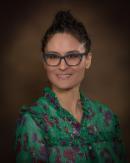UHV achieves reaccreditation with no recommendations
The University of Houston-Victoria recently was reaccredited through 2034 by the Southern Association of Colleges and Schools Commission on Colleges.
The university spent three years preparing its materials for the accreditation review. After the commission’s site visit to UHV’s campus in February, the assessment team had no recommendations for changes.
“The fact that we went through the process without any findings is a truly exceptional occurrence,” UHV President Bob Glenn said. “It is a bit like an occasional golfer who hits a hole-in-one. It is not impossible, but it is highly unusual. I would like to highlight the work of Dr. Joann Olson and the team she recruited to guide us through the process. They worked incredibly hard, and their dedication and work paid off! I am very proud of this institution and feel honored to work with such extraordinary colleagues.”
Preparation for the reaccreditation process began in 2021. The university began putting together a plan under the leadership of Sharon Bailey, UHV director of Institutional Research & Effectiveness at the time. When Bailey left the university in January 2022, leadership of the reaccreditation process was passed on to Joann Olson, UHV interim provost and vice president for academic affairs, who was serving as associate provost for research and dean of graduate studies at that time.
The accreditation process focuses on 88 standards that the institution needs to address in their application and review. In preparing the materials and working with individuals on campus for the site visit, Olson chose to begin offering a series of SACSCOC Facts sessions that were open to all faculty and staff members, she said.
“Many institutions choose to handle their reaccreditation application as a kind of top-down approach that doesn’t include much input from other areas of campus,” Olson said. “We decided to take a different approach and reach out to all of campus. That helped us promote more involvement in the process and shift the culture and perception on campus to be more invested in the process.”
That shift in approach allowed greater involvement in the creation of the university’s Quality Enhancement Plan, an important part of the process that creates a five-year plan to show how the university is continually improving, said Woodrow Wagner, UHV director of institutional strategies, who drafted the final version of the plan. The goal of a QEP is to identify gaps or issues in an institution and then put together a plan to address those needs. UHV’s QEP’s final version was compiled from the work of a campuswide task force and named the 5C for UHV: Cultivating Campus Culture with Creative Collaboration. The main issue the plan examines is UHV’s struggles with student retention and how to find solutions to that problem.
“In its reviews, SACSCOC doesn’t just want to see how the university is doing as a higher education institution; they want to see the process you followed to create that final product,” Wagner said. “We were fortunate to have such great buy-in from the faculty and staff who helped us make such an excellent, transparent and inclusive approach and plan for the future.”
As the university was putting together its application for review, Olson and Wagner sent in an application to present some of their work at the annual SACSCOC national meeting. Their application was accepted, and they presented their approach, including the SACSCOC Facts sessions and the work being done on the QEP. The feedback they received was surprising and encouraging, Wagner said.
“When people responded to our presentation, so many said that they’ve never seen an institution take this kind of approach before,” Wagner said. “To me, that shows that UHV is leading the way in creating an effective reaffirmation process. I’m extremely proud of what we’ve done over the past three years and the results that are beginning to emerge from that effort.”
In addition to the QEP, UHV’s reaccreditation application had to focus on a wide selection of topics, including educational program structure and content, facilities, administration and organization, faculty, student achievement, educational policies, academic support services and more. Each item needed to include documentation to prove it was in compliance. Nadya Pittendrigh, UHV associate professor of English, was one of the faculty members who helped write the reports for the application and collected documentation.
“SACSCOC demands evidence that we have and are following our policies, so I did a lot of communicating and reaching out to people all across campus to collect that documentation,” Pittendrigh said. “When we added it to our application and explained our work, we had to be sure that we used the terminology that was consistent with SACSCOC’s style. It was a long, involved process, and I am glad to see it was so successful.”
When she first joined the accreditation team three years ago, Pittendrigh remembered Sharon Bailey shared a message that she hoped would inspire the team as they worked toward reaccreditation.
“Sharon emphasized how much good UHV does,” she said. “Certainly, there are always things to fix, but the work the university does is important. It’s true, and that message has stuck with me. I’m proud of UHV for offering such a great education, and I’m proud that we were able to navigate this intense process and continue to improve as we move forward.”
In addition to UHV’s successful reaccreditation, Victoria College also recently was reaccredited and also had a successful site visit that ended with no recommendations, Wagner said.
“These reviews are opportunities for us to look at what we are doing and make sure we are doing our best to improve,” he said. “That’s good for us and good for our students. After these most recent reviews for UHV and VC, it’s clear that students can get a quality higher education in Victoria.”
The University of Houston-Victoria, located in the heart of the Coastal Bend region since 1973 in Victoria, Texas, offers courses leading to more than 50 academic programs in the schools of Arts & Sciences; Business Administration; and Education, Health Professions & Human Development. UHV provides face-to-face classes at its Victoria campus, as well as an instructional site in Katy, Texas, and online classes that students can take from anywhere. UHV supports the American Association of State Colleges and Universities Opportunities for All initiative to increase awareness about state colleges and universities and the important role they have in providing a high-quality and accessible education to an increasingly diverse student population, as well as contributing to regional and state economic development.




